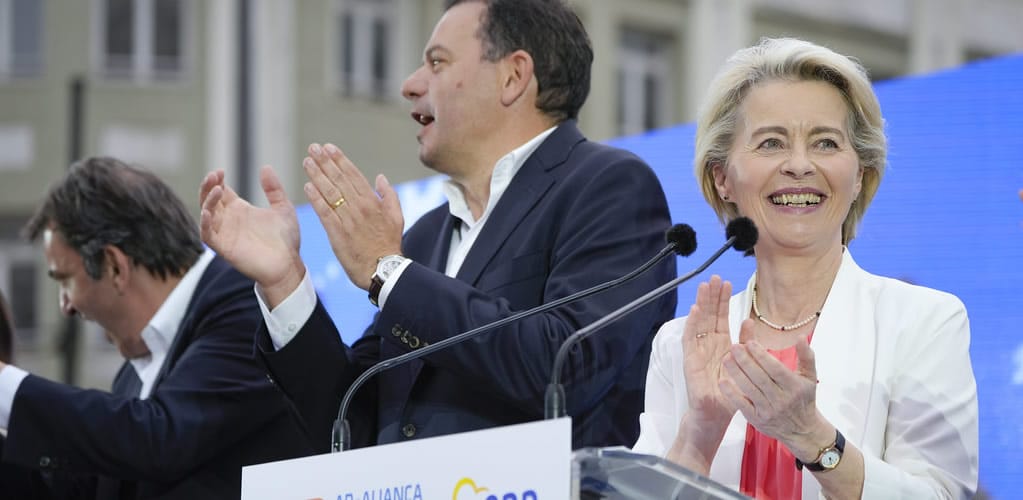EU parliament election sees shaken centre hold – but far-right now has chances to show its strength
The European parliamentary election highlighted a fragile centre amid a rightward shift, with significant far-right gains in France, Germany, and Italy. The EPP retained centre-ground dominance, but far-right successes may influence future EU policies.

A fter the four-day, 27-state democratic marathon that is the European parliamentary election, a picture has emerged of a fragile centre just holding amid a shift to the right that carries a significant potential to shape the near future of the EU, despite having fallen short of producing the earthquake some predicted.
The big shock came in France, with President Emmanuele Macron’s defeat at the hands of the RN (Rassemblement National – National Rally) party, prompting him to call snap national parliamentary elections. France needed not only “a clear majority” argued Macron, but citizens capable of “choosing to write history, not be driven by it”.
French fissures
After some early relief among centrists over Dutch and German projected returns, the French figures provided a swift jolt, with the RN (led by Marine Le Pen’s protege Jordan Bardella) producing its highest ever nationals levels, decimating Macron’s own “Renew Europe” coalition led by Valérie Hayer into the “second-lowest EU election finish ever for a party in French government”.
Across the EU though, the picture is more nuanced. Despite predictions that the European Parliament would garner more members than ever before from the populist and extreme right, the EPP representing mainstream conservative views in Europe has increased its overall size in this election, having retained the centre ground, in its role as “the chamber’s historically dominant force”, on track to gain roughly 25% of the parliament itself with 184 MEPs.
The centre-left Socialists and Democrats (S&D) group also retained its previous toehold. Having reconsolidated its power base, the EPP will retain clear responsibilities regarding EU policy, including industrial, agricultural and climate policies now deeply contentious with EU citizens. To do so, the EPP now needs to identify its preferred leadership in the next stage of EU institution elections, including the European Commission.
Still a good night for the far-right
While the EPP and S&D have retained the centre ground, far right parties still did remarkably well. They represent a range of views, and it was already impossible for them to band into a single electoral group, due to intractable splits on everything from Russia to European defence.
In France, the Le Pen/Bardella RN walked off with a stunning third of votes, while in Italy a quarter of voters backing Prime Minister Giorgia Meloni’s Brothers of Italy. Totalling up the remaining far-right votes across the EU illustrates that two key parliamentary groups on the hard right (ECR), and far-right (ID) will, between them, control 131 seats. Alongside, there are 34 additional hard-right independents drawn from Germany’s AfD, Viktor Orbán’s Hungarian Fidesz party, and those from Poland and Bulgaria.
There may be just enough in common among some of those to pull together nationalist, anti-immigration blocs in the European Parliament, setting them up as 2024’s biggest winners, eminently capable of shifting EU strategic policies to the right, including on immigration, trade, agriculture and climate change.
The numbers suggest that a single far-right group would be the EP’s second-largest party after the EPP. Coalition-building is tricky, particularly amongst far-right groups, but the numbers certainly count for something; “its sheer size will nonetheless put rightward pressure on EU policy,” reported specialist site Politico Europe.
Even if not formally consolidated, a conglomerate of far-right voices will concern the EPP and & S&D groups. At this point, far-right successes have three significant consequences. First: they confirm the anticipated tilt to the right of the parliament itself; second, they may further entrench far-right preferences in a sizeable minority of EU member states; third, within the parliament – and across the EU – they send a signal to international partners, including the US, that the EU may abruptly change tack in terms of policy, and preferred partners.
Green Means Go(ne)?
In the Netherlands, despite heavy predictions that Geert Wilders’ far-right Freedom Party (PVV) party would triumph in the parliamentary election, the Dutch Labour/Green alliance tied with them with seven seats apiece. For the Labour/Green alliance leader and former EU Commissioner Frans Timmermans, the outcome is something of a Pyrrhic victory. While no clear reprieve is in sight for the Netherlands itself in the face of recent slides to the right, the Dutch Labour/Green alliance has held together sufficiently to return an even number of seats to the EP, and in symbolic terms. It gives them, said Timmermans, much-needed “strength to keep fighting for a social and green Europe” at the EU level.
Green triumphs elsewhere were harder to find. German results, for example, put them fourth, a drop of 8.5% from 2019. In France, the Greens returned roughly 5%, the minimum electable threshold for MEPs. Absent the backing of French and German Greens and despite small increases in the Netherlands and Denmark, Europe’s Greens will now slip from fourth to sixth in the parliament, making them far less of a policy leader than previously, despite the extreme climate crisis facing Europe.
Does the European Parliament = the EU?
For many, the parliamentary election outcome is totemic of where the EU as a whole is headed: these results serve as a barometer of where national politics is headed in some of Europe’s most crucial capitals. In 2019, the EP returned a “green wave” of MEPs which catalysed a slew of ensuing green actions on climate change and green deals aimed at restructuring the EU from top to bottom in climate-friendly terms. Despite the ideological differences between conservative, populist, groups on the one side and the far- and hard-right on the other, the critical mass of avowedly Eurosceptic groups represents a categoric desire to remake key parts of the EU’s legislature, possibly decoupling the EU project itself from its post-war foundations.
For others, the parliament is not a microcosm of the EU. Not only will the series of right-leaning parties struggle to produce a super-group of any coherence within the party-specific complexities of the EP, the EU is a leadership-based entity, its key policies steered by big chiefs leading the European Commission, the European Council, the foreign policy chief, and to a far lesser extent, the parliament itself. The composition of the parliament, they will contend, has less to do with the strategic direction the EU will take post-election, and indicates instead preferences which are far more salient at national level, rather than continental.

— Ursula von der Leyen needs the backing of the EU Council and 361 votes in the EU Parliament for a second term as President of the Commission.
Weeks of coalition talks
With weeks of coalition building on the cards for core parties and individual MEPs, at least five big-ticket items remain for the parliament, and indeed the EU as a whole, beginning with the package of executive elections to EU institutions. Most important is the two-stage process by which Ursula von der Leyen needs first to be backed by the EU Council (heads of state) for a second term as President of the Commission, and whether she now has the 361 votes needed in the 720-seat parliament (she won by only nine in 2019).
After that, with new teams in place, the to-do list will include the war in the Ukraine and European security, the Israel-Hamas conflict, and ongoing cost of living squeezes, which currently comprises a lethal cocktail of “high consumer prices, loss of purchasing power, rising social inequalities and stagnant economic growth”, as well as migration and asylum issues, and retooling climate change obligations. Set against the outcomes of the UK and indeed US elections later in the year, the EU’s inbox – and the EP as watchdog for both the EU budget and key policies – is still at the mercy of the “polycrisis” phenomenon: a mix of volatile and protracted emergencies without real resolution.

GOING FURTHER
European election results 2024: live from across the EU | The Guardian
Far right makes gains in EU election but it could struggle to unite | BBC News
Far right makes significant gains in European parliament elections | Financial Times
EU elections: Macron to dissolve French parliament after crushing loss to far right | The Guardian
Sources:
▪ This piece was originally published in The Conversation and re-published in PUBLIC SQUARE UK on 10 June 2024. | The author writes in a personal capacity.
▪ Cover: Flickr/European People’s Party. - Ursula von der Leyen in Porto. | 6 June 2024. (Licensed under a Creative Commons Attribution-ShareAlike 4.0 International License.)







[Read our Comments Guidelines]